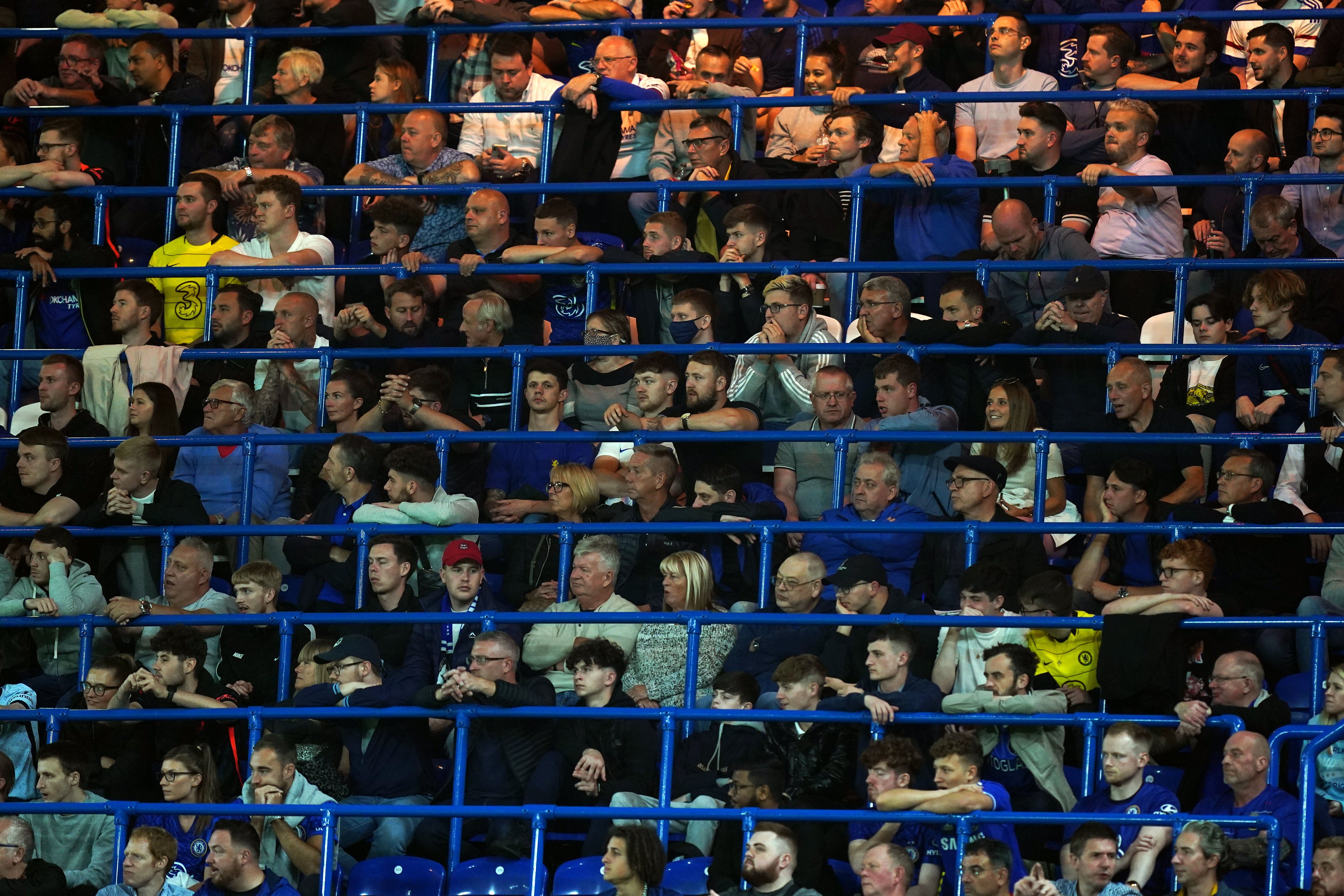Time to stand for something far more important than standing at football
The return of supporters being able to stand at top-flight football is long overdue but do not forget how and why we got here, writes Tony Evans


Your support helps us to tell the story
From reproductive rights to climate change to Big Tech, The Independent is on the ground when the story is developing. Whether it's investigating the financials of Elon Musk's pro-Trump PAC or producing our latest documentary, 'The A Word', which shines a light on the American women fighting for reproductive rights, we know how important it is to parse out the facts from the messaging.
At such a critical moment in US history, we need reporters on the ground. Your donation allows us to keep sending journalists to speak to both sides of the story.
The Independent is trusted by Americans across the entire political spectrum. And unlike many other quality news outlets, we choose not to lock Americans out of our reporting and analysis with paywalls. We believe quality journalism should be available to everyone, paid for by those who can afford it.
Your support makes all the difference.Today is a landmark day in the Premier League. It will be legal for supporters at the Chelsea vs Liverpool match to stand during a top-flight game for the first time since the 1990s. This is a big moment for English football.
For Liverpool fans, too. No longer will they have to endure the sound of “if it wasn’t for the Scousers we could stand,” booming out from crowds across the country. This wasn’t quite as bad as “you killed your own fans,” or “The Sun was right, you’re murderers.” It was the Hillsborough song for people who like to pretend they don’t sing Hillsborough songs.
Terraces were banned in the aftermath of the 1989 disaster that led to the deaths of 97 Liverpool supporters on the Leppings Lane at the FA Cup semi-final against Nottingham Forest. Lord Justice Taylor’s subsequent report stated that standing was not in essence unsafe but the government got rid of terracing anyway. That suited the narrative. The idea that standing killed people had already become one of the founding lies of Hillsborough. Even the families of some of the dead believed this and became implacable opponents of anything other than all-seater stadiums.
Of course supporters never stopped standing. They just did it in seats. Sometimes while singing about Scousers taking away their ability to stand. It was never very safe but, exercising a magnificent hypocrisy, the authorities could pretend that everything was alright. Football was fixed.
Rail seating is a very different proposition to the old terraces. Its introduction to Premier League grounds is welcome. These sections make watching live football less dangerous.
The symbolism is important, too. That is why it is strange – and ironic - that the first game should feature Liverpool. Anfield is not involved in the experiment, which is understandable given the sensitivities around the subject. In the circumstances, it might have been a bit more appropriate to begin the new age of standing with a game that didn’t involve the club and the supporters who have spent almost three decades being blamed for the abolition of the terraces. Then again, when did anyone in football’s corridors of power give Hillsborough a second thought?
Stamford Bridge is a weird choice of venue, too. Given the momentous nature of the game and the emotions it will evoke, it might have been prudent to take into account the past behaviour of an element of Chelsea supporters towards the disaster. Their low point came a decade ago when they disrupted the minute’s silence on FA Cup semi-final day with chants of ‘murderers.’ Hillsborough denial is a popular form of entertainment for some of the London club’s fanbase.
But, never mind, it feels almost like a chapter is closing. Standing’s back, all is well, we can forget about Hillsborough once and for all and move on.
Again, there is some irony that the match will take place a matter of hours before Anne airs on ITV1. The four-part drama is based on the life of Anne Williams, whose 15-year-old son Kevin died after being crushed on the Leppings Lane. It charts a mother’s campaign for justice in the face of police lies and government obstruction and her bravery against almost impossible odds. After watching the series – shown over four consecutive nights – it is impossible not to question your faith in the authorities.
This is not historical drama. It resonates today. On Friday there will be a public launch by Merseyside MPs aimed at pushing through a Hillsborough Law - legislation that would demand a duty of candour from public employees. This law would insist that police and civic officials tell the truth in investigations, court proceedings and inquiries. Although the potential new regulations are named after a disaster that occurred 33 years ago, they are very much about the future. Any time anyone attends a public event, they must be able to do so in the knowledge that they are protected by the people paid to look after their safety. If anything goes wrong, we need to be confident that the authorities – and the public - will quickly understand the reasons why any catastrophe happened and learn from it so similar incidents can be prevented in years to come.
All the safe standing campaigners will be patting themselves on their backs today. But of all the ugly consequences of Hillsborough, the ban on standing was the most trivial. David Duckenfield, who made the decision that caused 97 deaths, walked free from a court after a farcical trial. Three of his colleagues admitted altering numerous statements from low-ranking officers but were acquitted of perverting the course of justice because the corrupted evidence was delivered to a public inquiry and not a legal court case. Norman Bettison, who was described in Parliament as orchestrating a “black propaganda” unit that deflected blame onto the fans, was not charged with any crime. These examples are the tip of the iceberg. Every time anyone sang about Scousers and standing it let the South Yorkshire Police and the government off the hook.
Losing the right to stand was not ideal but it was nothing compared to the families who lost their loved ones. Or the survivors and witnesses whose reputations were trashed by the media, some of whom lost their sanity.
So, for anyone who sang the songs about Scousers and standing who is celebrating today, here’s a reminder: if it wasn’t for the South Yorkshire Police you could have stood. If you hadn’t believed the ludicrous and obscene lies about fellow fans, there might have been a more reasonable response to the tragedy and you could have stood. If you hadn’t trivialised people’s deaths and instead put some energy into righting an outrageous wrong, you probably could have stood.
Enjoy the ability to stand. It is long overdue. But do not forget how and why we got here. Remember that this is not finished.
You’ve got your standing back. Great. Now how about getting behind something really important like the Hillsborough Law. Not for those affected by what happened 33 years ago in Sheffield, but for those who might find themselves in a similar nightmare in the future, in or out of football. Because, god forbid, it might not be Scousers next time. It might be you.

Join our commenting forum
Join thought-provoking conversations, follow other Independent readers and see their replies
Comments